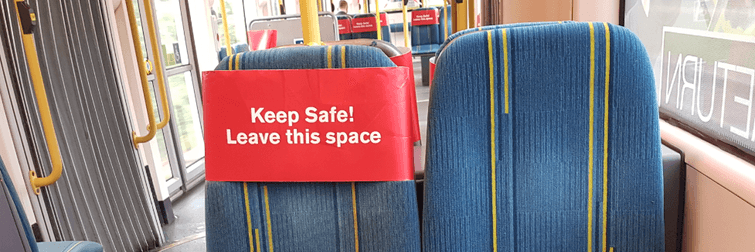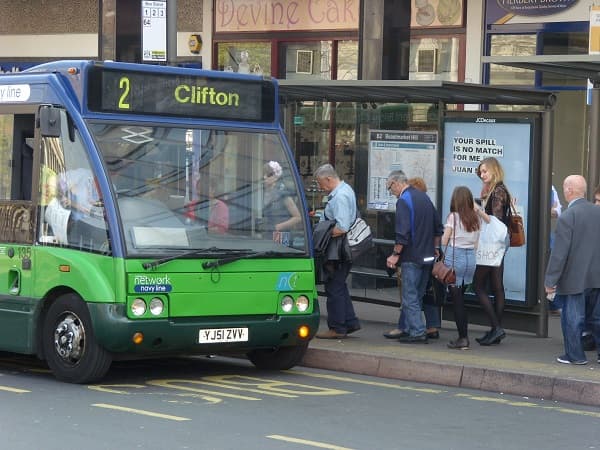
blog: Can a different delivery model secure the future of the bus?
Thursday 15th October 2020
I’m probably not alone in wondering what the future holds for public transport. Bus patronage was in gradual decline before the pandemic. Now, social distancing restrictions, changing travel demands, and messaging to avoid public transport, means patronage is at an all-time low.
Looking ahead, travel patterns could be vastly different in terms of frequency, times and modal choice. How this will translate to the requirement for buses in the future is as yet unknown, but it is unlikely that patronage levels will fully support commercial operation any time soon.
However, buses play a vital role in meeting climate change targets, reducing congestion, levelling up opportunities for parts of society and supporting the economy.
In the current climate, bus operators will be more risk averse; some are going out of business. This will mean less investment from the private sector, less competition, and less value for money for bus users. Will these factors influence a change in government policy?
With a heavy reliance on government funding via BSOG, ENCTS reimbursement and CBSSG, and through local government support and contracts, should central government look to alternative ways to support buses?
As well as presenting local authorities with new powers to improve partnership working (through Advanced Quality Partnerships and Enhanced Partnerships), The Bus Services Act 2017 provides Mayoral Combined Authorities with the powers to implement franchising schemes. These different bus delivery models differ as follows:
- Advanced Quality Partnership – authorities and operators agree to work together to improve services on a voluntary basis, but still within a deregulated environment.
- Enhanced Partnership – authorities and operators agree to work together to improve services in a more formalised way, whereby each is legally bound to the commitments made. The overall environment is still deregulated, but with additional requirements on operators in respect of service provision and/or vehicles.
- Franchising Scheme – authority controls and specifies services, which operators provide under contract.
Given current circumstances and uncertainty in the market, central government I’m sure will be considering its options – continue to fund buses through current funding mechanisms or look at other possibilities. Is now the time to open up the availability of franchising to more authorities?
Our work with CPCA and TfWM on bus delivery models, and learning how other Mayoral Combined Authorities have considered these options, has taught us a few things:

- It is important to define the vision, objectives and outcomes at the out-set, and assess the delivery options against their respective ability to achieve these, along with the funding available; franchising should not be assumed to be the answer.
- Effective partnership working and brave political decisions can yield positive results without the need to franchise.
- The “shape” of a franchise scheme (e.g. timing of implementation; geography; and financial and technical operation of a scheme) needs careful consideration, it doesn’t have to be an all or nothing scenario.
- Instigating franchise schemes is currently a long and arduous process, requiring a detailed business case, independent audit and statutory consultation. These requirements may need to be changed, to be proportionate to the size and nature of the scheme, if this is to be rolled out more widely.
- There is a shortage of skilled people within many local authorities which will need to be overcome if franchising, or indeed strong partnership working, is to be pursued.
- More creative thinking is needed around franchising schemes. A London or Manchester approach won’t be right for all areas. Much can be learned from the Dutch approach, with joint planning of services and operators incentivised to build patronage and revenue.
- Careful thought needs to be given to a host of different issues: revenue and risk; implementation programme; asset ownership; cross-subsidy; cross-boundary operations; state aid; competition; and scheme management are just some of the factors to consider when implementing a franchising scheme.
However bus services are delivered in the future, it is important we emerge from this pandemic with vibrant bus provision that contributes to an integrated, sustainable transport system that offers a real alternative to the car and is accessible to all. As well as providing financial support to bus operators, it is important to invest in bus priority, technology, clean vehicles, information, ticketing solutions and marketing. Now may be the time to think differently about how we can achieve this long into the future.
To discuss different bus delivery models and how they could be considered in your area, please contact Denise Faber.
